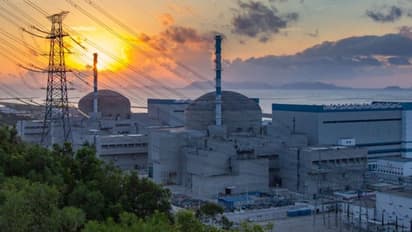China is fixing a 'performance issue' at the Taishan nuclear power plant

Synopsis
The plant's number one reactor experienced a build-up of noble gases in its primary circuit, which is part of the cooling system.
A nuclear power plant in southern China's Taishan is fixing a performance issue at the facility built with French technology.
The Taishan nuclear power plant in Guangdong province is owned and operated by TNPJVC, a joint venture of China General Nuclear Power Group and Electricite de France (EDF). The French nuclear electric power generation company has a 30% stake in the project.
The technical issue at the Chinese plant hit global headlines after CNN reported that United States officials were assessing a reported leak at the nuclear facility. The CNN report claimed that the Chinese safety authority had raised the acceptable limits for radiation outside the facility to ensure that the nuclear plant is not shut down. It cited a letter from Framatome, the subsidiary of EDF, to the US energy department as evidence of this.
However, the International Atomic Energy Agency clarified there is no indication of any radiological incident occurring at Taishan.
EDF said the plant's number one reactor experienced a build-up of noble gases in its primary circuit, which is part of the cooling system. Noble gases like Xenon and Krypton are bi-product of nuclear reactor operation and are also sometimes an indicator of a problem.
According to Geoff Brumfiel, editor-correspondent for NPR Science, the readings and statement show there's something going on.
He said that possibility could either be cracked or damaged fuel rods, which can potentially cause an excessive build-up of noble gases.
"In particular, radioactive xenon (Xe-133) can be released from nuclear power plants during refuelling or during accidents. Because Xe-133 is non-reactive, it can seep through pipes and buildings," He said on Twitter.
"But Xe-133 is not necessarily dangerous. It is non-reactive in nature. It means that it isn't easily taken up by biological organisms. And it will disperse into the atmosphere," he added.
An EDF spokesman clarified that currently, there is no scenario of an accident with a melting core.
"We are not talking about contamination. We are talking about controlled emissions," he said.
Check the Breaking News Today and Latest News from across India and around the world. Stay updated with the latest World News and global developments from politics to economy and current affairs. Get in-depth coverage of China News, Europe News, Pakistan News, and South Asia News, along with top headlines from the UK and US. Follow expert analysis, international trends, and breaking updates from around the globe. Download the Asianet News Official App from the Android Play Store and iPhone App Store for accurate and timely news updates anytime, anywhere.